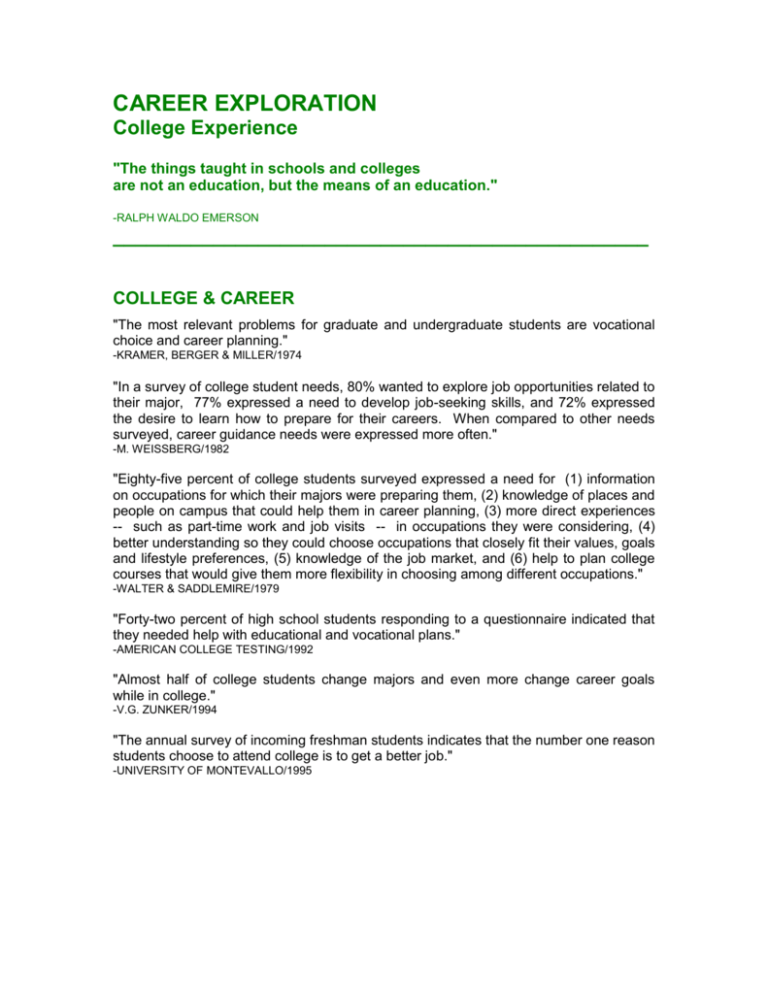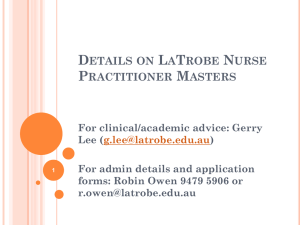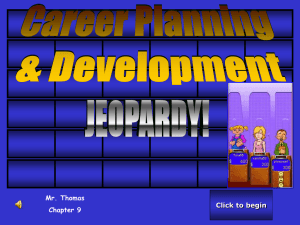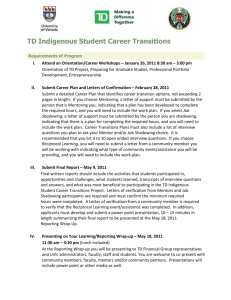College Experience - AlabamaConnection
advertisement

CAREER EXPLORATION College Experience "The things taught in schools and colleges are not an education, but the means of an education." -RALPH WALDO EMERSON ________________________________________________ COLLEGE & CAREER "The most relevant problems for graduate and undergraduate students are vocational choice and career planning." -KRAMER, BERGER & MILLER/1974 "In a survey of college student needs, 80% wanted to explore job opportunities related to their major, 77% expressed a need to develop job-seeking skills, and 72% expressed the desire to learn how to prepare for their careers. When compared to other needs surveyed, career guidance needs were expressed more often." -M. WEISSBERG/1982 "Eighty-five percent of college students surveyed expressed a need for (1) information on occupations for which their majors were preparing them, (2) knowledge of places and people on campus that could help them in career planning, (3) more direct experiences -- such as part-time work and job visits -- in occupations they were considering, (4) better understanding so they could choose occupations that closely fit their values, goals and lifestyle preferences, (5) knowledge of the job market, and (6) help to plan college courses that would give them more flexibility in choosing among different occupations." -WALTER & SADDLEMIRE/1979 "Forty-two percent of high school students responding to a questionnaire indicated that they needed help with educational and vocational plans." -AMERICAN COLLEGE TESTING/1992 "Almost half of college students change majors and even more change career goals while in college." -V.G. ZUNKER/1994 "The annual survey of incoming freshman students indicates that the number one reason students choose to attend college is to get a better job." -UNIVERSITY OF MONTEVALLO/1995 COLLEGE ADVANTAGE “Students with college experience have distinct advantages over their high school counterparts. There are significant occupational status differences between high school & college graduates that are sustained throughout life. Individuals with a bachelor's degree are more likely to obtain high-status managerial, technical and professional jobs. College graduates are less likely to be unemployed than high school graduates. College graduates are seen by employers as possessing requisite skills and values that make them more desirable for employment and advancement. College graduates enjoy significantly higher levels of career mobility and advancement. College tends to develop a capacity for critical judgment and evaluation that in turn provides sensitivity to shortcomings of jobs. Socialization in college increases student occupational aspirations. College may enhance occupational success by facilitating development of traits that describe a psychologically mature person (reflective intelligence, empathy, altruism, ability to combine a variety of views, stability and autonomy).” - PASCAREL & TERENZI / 1991 EDUCATION OUTSIDE THE CLASSROOM "As long as instruction and life do not merge in our colleges, so long as what the undergraduates do and what they are taught occupy two separate, air-tight compartments in their consciousness, so long will college be ineffectual." -WOODROW WILSON / US President "In the classroom there is more teaching than learning. Outside the classroom there is more learning than teaching. Some students are so busy going to classes that they have little time to get an education." -EDGAR DALE / Author & Educator "Realize there are other aspects of the college experience -- besides the classroom -that are important too." -WILLIAM COBB / English Professor & Author "The total university experience is far more than the opportunity to pursue one's career goals in the classroom. It also offers the unique opportunity to serve and be served and to lead and be led. An essential part of your education is linked to the opportunity to participate in student organizations and activities. Leadership, character development and socialization of an individual are enhanced when one chooses to affiliate and participate actively in one of our campus student organizations." -FREDA SHIVERS / Student Affairs Professional "Campus experiences outside the classroom enhance and expand the education a student receives while in college. Extracurricular activities are an extension of one's college education over and above the pursuit of a degree and clearly make the student more valuable and marketable upon graduation." -MICHAEL LEBEAU / College Career Counselor "I would advise today's students to be adaptable. Since you don't know exactly what you want to do, be willing to do a lot of different things. Get your foot in the door. Careers are fluid." -COLLEGE GRADUATE / Middlebury College "College didn't fit me for any certain career, but it taught me how to learn." -COLLEGE GRADUATE / Cal State Univ Fresno "We frequently see straight A students who can't make the cut. A pathetic preoccupation with grades seems to clog the entryway for other experiences." ROBERT ARMSTRONG / Manager "Be prepared for a new and different world; you will find yourself caught up in a country awash with change." -ELIZABETH DOLE EXTRACURRICULAR ACTIVITIES Employers continually express a strong preference for candidates with experience that goes beyond mere academic credentials. With more and more college graduates entering today's competitive job market, it becomes necessary for candidates to demonstrate how their college experience yielded more than just a degree. Employers seek candidates who gained additional experience during their college tenure through involvement in campus organizations, internships, community service projects and parttime jobs. TRANSFERABLE SKILLS Through active participation in campus clubs and organizations, students are provided an opportunity to use and develop their skills in leadership, interpersonal relations, event planning, committee membership, fund raising and a variety of other skills that can easily transfer to the workplace. Volunteer activities also offer students the chance to gain valuable experience through a wide range of community service projects and philanthropic efforts. Practical experience in a risk-free environment can be gained through internships, cooperative education, and part-time or temporary jobs. In addition to acquiring careerrelated knowledge and skills, students are able to make important personal contacts within their field of interest. It is a chance for them to get their foot in the door. UNIQUE OPPORTUNITIES Students have available to them a wealth of on-campus opportunities related to their professional growth. Most university campuses offer, at little to no cost to the student, numerous chances throughout the school year to attend career information fairs, career issues forums, employment interview sessions, job skills workshops and other careerrelated events. A variety of training, counseling, advising and assessments await the student who realizes the intrinsic value of these offerings. The extent to which college students actively take advantage of the many resources and services offered for their development will be reflected in their level of preparedness and employability upon graduation. PREPARATION College students should begin in their Freshman year preparing for the world of work. According to career counselors, by the time a student completes his or her Senior year, he or she should have accomplished some, if not all, of the following activities: Career Testing Visit Career Center Job Shadowing Part-time Job in Field Voluntary Community Service Get Help Writing a Resume Learn Effective Interview Skills Learn Effective Job Seeking Strategies Talk with a Mentor Talk with Professors about Career Goals Attend Career Fairs Join Professional Organizations Internship or Co-op Establish Professional Contacts Attend a Professional Convention Assume a Leadership Position Participate in a Campus-Wide Project Join a Campus Organization Build a Prospect List Read Material Related to Field ________________________________________________ EXPERIENTIAL EDUCATION "Tell me and I forget. Show me and I may remember. Involve me and I learn." -BENJAMIN FRANKLIN The concept of Experiential Education has been around for the last century and was present in the creation of federal programs which combined work and study, such as the Civilian Conservation Corps of the 1930s, in the creation of vocational education programs, in the emergence of Outward Bound and later the Peace Corps, and in the prominence of Co-op and internship programs in the 1960s and early 70’s. Experiential Education has seen a resurgence of popularity in programs that promote service learning programs and other programs that promote intentional learning outcomes. In its purest form, Experiential Education is a process that begins with “raw experience.” This experience is filtered through an intentional learning format and transformed into working, useable knowledge. It’s making meaning out of experience. The learning formats most often associated with Experiential Education include cooperative education, internships, outdoor education, organizational development and training (like mentoring and shadowing), and service-learning. “Experience happens; it is unavoidable. The true learning depends on how we make meaning out of our experience.” -JOHN DEWEY “Today’s college students tend to prefer more concrete, hands-on learning experiences. Our incoming class of freshman represent a new generation of students that can be described as smart, ambitious, incredibly busy, and ethnically diverse. One other characteristic about this generation is that they like to plan. They are focused on the future and believe that any work they do today should be a planned and preparatory investment for the permanent life they wish to lead tomorrow. They are more likely to find summer jobs that serve the community or teach new professional skills than to bother with jobs that simply generate spending money. The popularity of the word internship is suggestive. The jobs this new generation of students find most attractive are apprenticeships that promise to pay off over a lifetime.” -HOWE & STRAUSS REDUCING RISK Experiential education provides practical opportunities for students to gather information about their career goals while reducing the risk associated with pursuing one’s career goals. Some career exploration activities are riskier than others. Some career exploration activities require a greater level of involvement. Certainly, the greater the involvement, the more irreversible the pursuit. Consider this “continuum of risk” regarding the various activities involved in career exploration. LOW RISK... Taking career assessments, reading the course catalogue, discussing academic major requirements with your advisor or professor, reading a book about your career options, visiting websites about your career options MEDIUM RISK... Conducting informational interviews, observing or shadowing someone on the job, talking with a mentor, performing volunteer work HIGH RISK... Internship, co-operative education, field experiences LOW 0 1 2 3 4 5 6 7 8 9 10 HIGH I-----------------------I--------------------I--------------------I-----------------------I--------------------I-----------------------I Career Assessment Career Research Career Exploration Experiential Education Fulltime Job Students are advised to get involved in lower risk activities first before advancing to higher risk activities. At any point during the research and exploration process a student can feel comfortable about changing his or her mind about a particular career option. Ultimately, the riskiest activity is entering a fulltime professional job without having subjected oneself to preliminary activities that help to solidify and crystallize the decision. INFORMATION INTERVIEWS Each day you have the opportunity to talk with people about their jobs or careers. The process of talking with people who have jobs that interest you is called "informational interviewing." Informational interviewing is simply talking with someone who is currently employed in a career that interests you. Your goal is to gather information that you need in order to make a good decision. Informational interviewing gives you the opportunity to interview an employer outside of an employment setting. There are distinct advantages to gathering career information in this way... The information is up-to-date. The information is local. You find out about the specific job setting. People are often candid about telling you the pros and cons of their jobs. And you are simultaneously developing a network of contacts. Informational interviewing is a very effective method of investigating your career options. People enjoy discussing their jobs and career fields. People are usually flattered that you are seeking their advice. People tend to be empathetic about career transitions because most have experienced the indecision and frustration associated with making a career decision. And people generally like to help others because it makes them feel good about themselves. For the most part, informational interviewing is a nonthreatening method of gathering vital information and developing a professional network. What are the primary objectives of informational interviews? To investigate a specific career field. To uncover areas that may have been unknown to you. To gain insight into what is happening in a career field. To gain insight about future trends in a career field. To obtain information that will help you to narrow options. To obtain advice on where you might fit in. To learn the jargon and important issues in the field. To broaden your own network of contacts for future reference. JOB SHADOWING A job shadowing experience provides the individual with the opportunity to observe a worker on the job in the course of his or her actual workday. The worker agrees to be shadowed or followed by an individual who is interested in learning more about his or her particular line of work. The individual accompanies the worker in the performance of his or her routine tasks and gathers valuable real world information about the field, the particular occupation, and the job setting. Because information gathered under these onsite circumstances tends to be accurate and authentic, the individual is able to get a true "feel" of the profession. MENTORSHIP A mentorship is a relationship set up between two individuals: a mentor and a protege. The mentor is an individual who is actively involved in a professional pursuit. A protege is an individual who meets with the mentor on an occasional basis to obtain firsthand advice. As a protege, you can gather helpful information directly from someone in your field of interest. A mentor is someone respected and knowledgeable who can advise and coach you in your field of interest. Seek advice from mentors experienced in the areas you want to explore. Don't limit yourself to seeking advice from just one mentor. Look for people who are open to your concerns, who can help you learn new skills, and who will take the time to explain organizational dynamics to you. Keep your relationship businesslike. A true mentor will develop an interest in you, make you aware of useful resources, and arrange opportunities for you to meet key people and grow professionally. Strive to meet your mentors' expectations for your performance. "Share information about your background, your needs, and your aspirations. Discuss goals to achieve your needs and aspirations. Set goals for yourself and follow through on them. Do not be afraid to raise your expectations or redefine your goals as part of this ongoing process. With your mentor, decide what steps will need to be taken to achieve your goals. Assert yourself. The purpose of the mentoring relationship is to teach you. Make sure you are learning. Be receptive to feedback and coaching. Feedback should be perceived as an opportunity for growth. Pay attention to changes in your life or attitudes that may call for updating your goals and objectives." -MURREY & OWEN / 1991 ________________________________________________ MICHAEL LEBEAU 2007









